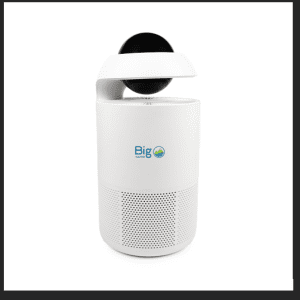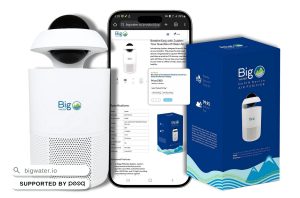Mumbai: As the global community faces a mounting environmental crisis marked by deteriorating air quality, escalating water scarcity, and the urgent need for sustainable development, innovative technologies are stepping in to reshape the narrative. One such groundbreaking initiative is the BigWater Protocol—a Web3-powered environmental accountability platform that merges digital technology with real-world impact. By gamifying climate action and leveraging blockchain, BigWater is not only incentivizing individuals to live sustainably but is also delivering measurable improvements in public health, environmental data, and resource distribution.
At the core of this project is the BigWater Air Purifier, a state-of-the-art DePIN (Decentralized Physical Infrastructure Network) device that transcends conventional air purification systems. Capable of cleaning up to 2 million litres of air per day, the device is designed to operate as a data node, transmitting real-time weather and environmental data back to the BigWater blockchain network. In exchange, users earn “Boond” points—a digital rewards currency that functions much like airline miles or credit card points. These can be redeemed for vouchers, gift items, and exclusive benefits via the BigWater mobile app, transforming climate responsibility into a rewarding daily habit.
The Gravity of the Problem: Pollution Statistics That Demand Urgent Action
The BigWater Protocol arrives not merely as an innovation, but as a critical intervention at a time when the world teeters on the edge of an environmental tipping point. The dual crises of air pollution and water scarcity are no longer distant projections—they are present-day emergencies with devastating human and ecological consequences.
 A landmark study published in July 2024 by The Lancet Planetary Health underscores the severity of India’s air quality crisis. The report analyzed PM2.5 exposure across ten of India’s most populous cities—Delhi, Mumbai, Bengaluru, Chennai, Ahmedabad, Hyderabad, Kolkata, Pune, Shimla, and Varanasi—and found that particulate matter levels exceeded the World Health Organization’s safe limits on 99.8% of monitored days. In short, clean air is a luxury that has become almost unattainable in urban India.
A landmark study published in July 2024 by The Lancet Planetary Health underscores the severity of India’s air quality crisis. The report analyzed PM2.5 exposure across ten of India’s most populous cities—Delhi, Mumbai, Bengaluru, Chennai, Ahmedabad, Hyderabad, Kolkata, Pune, Shimla, and Varanasi—and found that particulate matter levels exceeded the World Health Organization’s safe limits on 99.8% of monitored days. In short, clean air is a luxury that has become almost unattainable in urban India.
The human cost is staggering. In Delhi alone, over 12,000 deaths annually have been linked directly to air pollution, accounting for 11.5% of the city’s total mortality rate. The health implications go beyond respiratory ailments—studies increasingly associate prolonged PM2.5 exposure with cardiovascular diseases, neurological decline, fertility issues, developmental delays in children, and premature births. Air pollution has now surpassed smoking as the leading environmental cause of death globally, according to the WHO.
Meanwhile, the global water crisis mirrors this urgency with equal gravity. The World Health Organization (2023) reports that more than 4.4 billion people across 135 low- and middle-income countries currently lack access to safely managed drinking water. This figure has doubled since 2020, accelerated by rapid urbanization, over-extraction of groundwater, contamination from industrial runoff, poor infrastructure, and climate-change-driven droughts and floods.
The consequences are manifold. Beyond the obvious health impacts—waterborne diseases, malnutrition, and dehydration—the scarcity of clean water disproportionately affects women and children, who often bear the burden of fetching water over long distances, compromising their education, safety, and economic opportunities. It also stifles agricultural productivity, food security, and long-term socio-economic development, especially in rural and marginalized communities.
By tackling these twin challenges—air quality and water access—through a tech-enabled, reward-driven, decentralized model, BigWater is not merely offering relief—it’s building resilience. Its direct alignment with the United Nations Sustainable Development Goals—notably SDG 3 (Good Health and Well-being), SDG 6 (Clean Water and Sanitation), and SDG 13 (Climate Action)—positions it as a holistic climate-tech initiative. More than a product or platform, BigWater is a lifeline for millions and a scalable, data-verified blueprint for global climate resilience.
Also Read : Game-Changing, and Visionary Highlights of Modi Government’s Record Defence Capital Spending in 2025
How the BigWater Device Works: Environmental IoT Meets Web3
At the core of BigWater’s ecosystem is its flagship product—the BigWater DePIN Air Purifier. Engineered for both individual and community impact, the device integrates advanced HEPA filtration with real-time IoT sensors to actively remove harmful pollutants such as PM2.5, PM10, VOCs, and bacteria from indoor air. Capable of purifying up to 300 cubic meters daily, the device not only enhances personal well-being but also acts as a decentralized climate tool. Once activated and connected to the BigWater mobile app, the purifier automatically logs operational hours, which are verified on-chain to issue Boond points—a proprietary digital reward that can be redeemed for e-commerce vouchers, gifts, and even NFTs as proof of climate impact.
This end-to-end loop—clean air for users, clean water for others, and transparent data trails—makes the device not just a purifier, but a node in a decentralized global network for environmental restoration.
JanaJal: The Impact Partner Bringing Clean Water to Millions
At the foundation of BigWater’s clean water promise stands JanaJal, a pioneering social enterprise and India’s foremost innovator in decentralized water management technology. Over the past 12 years, JanaJal has delivered more than 200 million litres of clean, safe drinking water to underserved communities across India, making it a natural and powerful partner in BigWater’s mission to expand equitable water access.
JanaJal’s impact is not just measured in litres—it is recognized at the national level. The organization has been handpicked by the Government of India under two of the country’s most ambitious urban and rural water initiatives: the Jal Jeevan Mission, which aims to provide safe and adequate drinking water through individual household tap connections in rural India, and AMRUT 2.0, focused on improving urban water supply infrastructure. JanaJal is currently the only decentralized water delivery technology provider to receive this distinction, backed by a patent in smart water management systems.
Through its network of IoT-enabled Water ATMs, mobile water delivery systems, and community-based kiosks, JanaJal is uniquely positioned to bring last-mile connectivity to places that traditional pipelines cannot reach. With BigWater’s support, the same patented infrastructure is now being leveraged not just in India but is also poised to scale into water-stressed regions in Africa and Southeast Asia, where infrastructure deficits have long hindered water equity.
But what truly sets this partnership apart is its fusion of blockchain with humanitarian service. Every BigWater air purifier triggers the delivery of 1,000 litres of clean water, and this action is memorialized through NFTs issued to the purifier owner. These digital assets are more than symbolic—they are on-chain certificates of impact, transparently detailing the volume, location, and beneficiary data of each water delivery. This model creates a powerful Proof of Delivery and Proof of Impact mechanism, introducing a new paradigm in philanthropic transparency and accountability.
BigWater and JanaJal, together, are not just distributing water—they are delivering dignity, hope, and sustainability through a system where every breath of clean air rewards the earth with clean water.
Web3 Meets Climate Action: The Power of DePIN, DeFi, and DeSci


DePIN (Decentralized Physical Infrastructure Network):
In traditional models, environmental monitoring relies heavily on centralized institutions and costly infrastructure. BigWater flips this paradigm. Each BigWater Air Purifier functions as a DePIN device, contributing real-time environmental data—such as air quality, temperature, and humidity—to the blockchain. These devices are not just cleaning the air; they are also crowdsourced weather stations, turning everyday users into active climate contributors. The data shared becomes part of a global, decentralized sensor network, significantly enriching public access to hyperlocal environmental information.
DeFi (Decentralized Finance):
BigWater’s reward system, based on Boond points, exemplifies the financial inclusivity of DeFi. Every 20 hours of purifier operation earns the user Boond points, which can be redeemed for digital vouchers, retail gifts, or other perks, much like airline miles or loyalty rewards. But beyond the appeal of rewards, the Boond economy fosters a behavioral shift—recasting sustainable actions like operating an air purifier or enabling water access as income-generating activities. This transforms environmental stewardship into an economically viable lifestyle choice.
DeSci (Decentralized Science):
Data transparency and open research are critical in tackling complex issues like climate change. BigWater contributes to the emerging field of DeSci, where peer-driven, decentralized science uses publicly verifiable data for collaborative studies. The anonymized datasets collected by BigWater devices can be shared with academic institutions, citizen scientists, and environmental agencies, enabling open-source climate modeling, real-time pollution mapping, and data-backed policy formation.
By weaving together these three decentralized frameworks, BigWater transforms every device into a micro-node in a living, breathing global network—one that rewards sustainable behavior, verifies impact on-chain, and contributes to collective scientific advancement. Users are no longer bystanders—they are co-creators of climate solutions, empowered by technology and driven by tangible impact.
How It Works: Clean Air, Daily Rewards, and Verified Water Access
BigWater has transformed the traditional utility device into a multi-functional tool for personal wellness, social responsibility, and financial empowerment. The process is as simple as it is revolutionary—merging clean technology with blockchain innovation for everyday impact.
✅ Step 1: Install a BigWater DePIN Air Purifier
Users begin by installing the BigWater DePIN (Decentralized Physical Infrastructure) air purifier in their homes or workplaces. This device is engineered to purify up to 2 million litres of air per day, significantly reducing exposure to PM2.5 particles and other harmful pollutants.
🔄 Step 2: Operate for 20 Hours Daily
The device functions optimally when operated for 20 hours a day, during which it not only purifies the air but also collects and uploads real-time environmental data—including weather conditions, air quality levels, and pollutant readings—to the BigWater blockchain protocol.
💧 Step 3: Earn “Boond” Points Automatically
For every 20-hour cycle completed, users are rewarded with “Boond” points—BigWater’s digital incentive token. These points are credited to the user’s mobile application and can be redeemed like airline miles or credit card reward points.
🎁 Step 4: Redeem for Vouchers, Gifts & Experiences
Boond points open up a wide range of redeemable perks, from e-commerce vouchers and eco-friendly gift items to access to exclusive events and experiences. This rewards mechanism adds a gamified layer to environmental responsibility, making sustainability personally rewarding.
🚰 Step 5: Trigger 1,000 Litres of Clean Water Delivery
Every purifier activated also initiates the delivery of 1,000 litres of safe drinking water to marginalized and water-scarce communities. This is carried out in partnership with JanaJal, ensuring reliable last-mile distribution.
🔗 Step 6: Receive a Blockchain-Based NFT for Proof of Delivery
To ensure transparency and traceability, each water delivery is logged and verified via a blockchain-issued NFT. This NFT is tied to on-chain data reflecting the time, location, and volume of water distributed—marking the first time such Proof of Delivery and Impact has been implemented on this scale.
With this intuitive model, BigWater creates a closed-loop ecosystem where individual health, community welfare, and economic incentives converge. It’s a new era of environmental participation, where every breath taken and every device installed contributes to a cleaner, fairer, and more sustainable world—and the benefits are as personal as they are planetary.
Gamified Climate Action: The Power of Boond Points and NFTs
What truly sets BigWater apart in the climate-tech landscape is its innovative fusion of gamification, blockchain, and sustainable behavior. At its core lies the Boond Points system—a revolutionary rewards mechanism that transforms simple, eco-friendly actions into meaningful incentives. Each user earns Boond Points daily through verified engagement with IoT-connected, water-purifying devices. These points aren’t just a symbolic nod to climate-conscious behavior—they have real-world value. Users can redeem them for high-value e-commerce vouchers, eco-friendly products, exclusive BigWater merchandise, and even climate-positive experiences.
But BigWater doesn’t stop there. To ensure radical transparency and accountability, the platform incorporates NFT-based Proof of Delivery (PoD) certificates. Every time water is delivered to a remote or underserved community through BigWater’s decentralized infrastructure, the event is captured on-chain as a blockchain-verified NFT. These dynamic NFTs act both as evidence of environmental impact and digital collectibles—badge-like tokens that reflect a user’s contribution to real-world change.
By combining Web3 mechanics with real climate outcomes, BigWater is gamifying global good. The platform plans to roll out leaderboards, climate quests, and social sharing features, encouraging friendly competition and community involvement. The result? A thriving digital ecosystem where individuals don’t just reduce their carbon and water footprints—they become celebrated participants in a verified, data-driven mission to heal the planet.
BigWater’s model doesn’t just engage users; it empowers them as stakeholders in a decentralized climate movement—where every drop saved, every action taken, and every point earned contributes to a measurable, trackable, and transparent global impact.
A Growing Movement: What’s Next for BigWater
As environmental concerns mount worldwide and traditional systems falter in addressing the urgency of climate action, BigWater is emerging not just as a product—but as a movement. With its official product sales now live at Big Water, the initiative is accelerating the transition from awareness to action, offering 100% cashback to early adopters in the form of Boond points. This is not just a commercial launch—it’s the unveiling of a tech-powered environmental revolution.


To further remove barriers to access, BigWater is offering free global shipping to a growing list of countries, including India, China, Japan, Indonesia, Vietnam, Malaysia, Philippines, South Korea, Singapore, Thailand, Russia, Ukraine, and Hong Kong—ensuring that climate-conscious individuals across the world can participate without added logistical or financial burdens.
The initiative is also rapidly building momentum across social platforms, with strong community engagement on:
- LinkedIn: BigWaterProtocol
- Instagram: @bigwater.protocol
- Twitter/X: @BigWProtocol
- Facebook: BigWater.DePIN
- Discord: Join the BigWater Community
These platforms are not just tools for promotion—they serve as hubs of collaboration, knowledge sharing, and empowerment, bringing together climate advocates, blockchain developers, scientists, and everyday citizens committed to real change.
Looking ahead, BigWater’s roadmap includes global expansion, deeper integration with decentralized science networks, enhanced reward systems, and the deployment of additional physical infrastructure devices that can contribute to even more environmental data and social impact.
“The goal is not just to sell devices,” says Dr. Parag Agarwal, Founder of BigWater. “It’s to build a global, decentralized force for environmental good—a network of individuals who understand their power and choose to act, every single day.”
In a time when the climate crisis can feel overwhelming, BigWater delivers a tangible, inclusive, and technology-driven response. It’s a blueprint for environmental responsibility in the Web3 era—where air, water, data, and decentralized rewards converge to drive sustainable change from the ground up.
With every purifier installed, every litre of water delivered, and every Boond point redeemed, BigWater is proving that the future of climate action is decentralized, measurable, and personal.
For more real time updates, visit Channel 6 Network.


Amazing article !!